-
 Bitcoin
Bitcoin $87,178.7996
-0.04% -
 Ethereum
Ethereum $1,998.7324
-1.04% -
 Tether USDt
Tether USDt $0.9998
-0.04% -
 XRP
XRP $2.3235
-1.80% -
 BNB
BNB $635.0121
2.03% -
 Solana
Solana $137.4968
-0.47% -
 USDC
USDC $1.0001
0.01% -
 Dogecoin
Dogecoin $0.1900
-2.87% -
 Cardano
Cardano $0.7373
0.56% -
 TRON
TRON $0.2332
0.48% -
 Chainlink
Chainlink $15.4073
0.11% -
 Toncoin
Toncoin $4.0060
7.96% -
 Avalanche
Avalanche $22.0344
-0.83% -
 UNUS SED LEO
UNUS SED LEO $9.7865
-0.04% -
 Stellar
Stellar $0.2862
-0.77% -
 Sui
Sui $2.7777
4.01% -
 Shiba Inu
Shiba Inu $0.0...01387
-3.80% -
 Hedera
Hedera $0.1929
-0.39% -
 Polkadot
Polkadot $4.5981
-2.54% -
 Litecoin
Litecoin $92.5860
-0.78% -
 Bitcoin Cash
Bitcoin Cash $324.3480
-3.52% -
 MANTRA
MANTRA $6.4538
-1.60% -
 Bitget Token
Bitget Token $5.0171
-0.58% -
 Pi
Pi $0.8335
2.54% -
 Dai
Dai $0.9999
-0.01% -
 Ethena USDe
Ethena USDe $0.9988
-0.05% -
 Hyperliquid
Hyperliquid $14.8082
1.30% -
 Uniswap
Uniswap $6.7448
-0.36% -
 Monero
Monero $226.0732
2.12% -
 NEAR Protocol
NEAR Protocol $3.0136
-1.01%
How to ensure the security of Bitcoin wallet addresses?
Secure your Bitcoin by using strong passwords, 2FA, a hardware or paper wallet, and avoiding phishing. Regularly back up your wallet and diversify your holdings, staying updated on security best practices.
Mar 23, 2025 at 02:35 pm
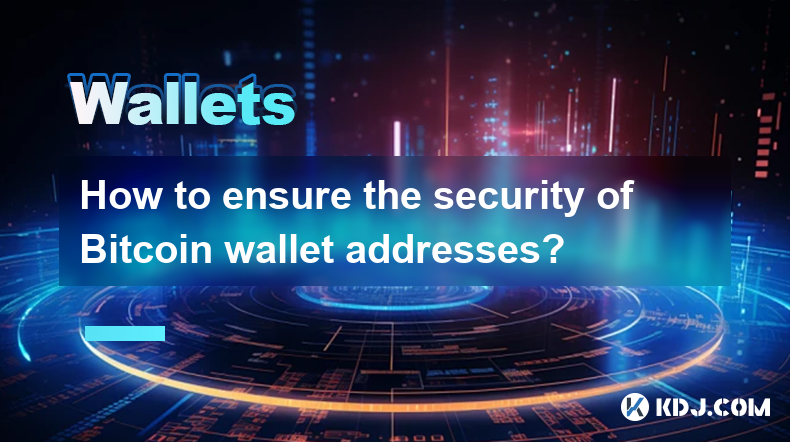
Key Points:
- Understanding the different types of Bitcoin wallets and their inherent security levels.
- Implementing strong password practices and utilizing two-factor authentication (2FA).
- Choosing secure storage options for your private keys, including hardware wallets and paper wallets.
- Recognizing and avoiding phishing scams and malware.
- Regularly backing up your wallet and diversifying your holdings.
- Staying updated on security best practices and software updates.
How to Ensure the Security of Bitcoin Wallet Addresses?
Bitcoin wallet security is paramount. Losing access to your Bitcoin wallet means losing your funds, irretrievably. This article explores various methods to bolster the security of your Bitcoin wallet addresses. The security of your Bitcoin depends heavily on the security of your wallet.
Understanding Wallet Types and Security:
Different Bitcoin wallets offer varying levels of security. Software wallets, while convenient, are more vulnerable to malware and hacking if not properly secured. Hardware wallets, on the other hand, store your private keys offline, offering a much higher level of security. Paper wallets, though secure if handled correctly, are prone to physical damage or loss. Choosing the right wallet type is the first step in securing your Bitcoin.
Password Management and 2FA:
Employing strong, unique passwords is crucial. Avoid easily guessable passwords and consider using a password manager to generate and store complex passwords securely. Enabling two-factor authentication (2FA) adds an extra layer of security, requiring a second verification method, such as a code from your phone, before accessing your wallet. This significantly reduces the risk of unauthorized access even if your password is compromised.
Secure Storage of Private Keys:
Your private keys are the key to your Bitcoin. Never share them with anyone. For software wallets, ensure you have strong anti-malware and anti-virus software installed and updated. For hardware wallets, choose reputable brands and store them securely. Paper wallets should be stored in a safe, fireproof location, ideally in multiple locations for redundancy.
Avoiding Phishing and Malware:
Phishing scams are common in the cryptocurrency world. Be wary of suspicious emails, websites, or messages requesting your private keys or wallet details. Legitimate companies will never ask for such information. Install reputable antivirus software and keep it updated to protect your computer from malware that could steal your Bitcoin. Always verify the legitimacy of any website or communication before interacting with it.
Regular Backups and Diversification:
Regularly back up your wallet. This is crucial in case of hardware failure, loss, or theft. The backup method will vary depending on your wallet type. Diversifying your Bitcoin holdings across multiple wallets can also mitigate risk. This means not keeping all your Bitcoin in one single wallet. This way, if one wallet is compromised, you won't lose all your funds.
Staying Updated:
The cryptocurrency landscape is constantly evolving, and so are security threats. Stay informed about the latest security best practices and vulnerabilities. Keep your wallet software updated to benefit from the latest security patches. Monitor your wallet activity regularly for any suspicious transactions.
Common Questions:
Q: What is a private key, and why is it so important?
A: Your private key is a secret code that proves your ownership of your Bitcoin. Without it, you cannot access or spend your Bitcoin. It's crucial to protect it meticulously.
Q: Are hardware wallets truly more secure than software wallets?
A: Yes, hardware wallets generally offer superior security because they store your private keys offline, making them immune to most online threats like malware and hacking attempts.
Q: What should I do if I suspect my Bitcoin wallet has been compromised?
A: Immediately change your passwords, contact your wallet provider (if applicable), and monitor your account for any unauthorized activity. Consider reporting the incident to the appropriate authorities.
Q: How often should I back up my Bitcoin wallet?
A: It's recommended to back up your wallet regularly, at least once a month, or even more frequently if you frequently transact.
Q: What is a seed phrase, and how important is it?
A: A seed phrase (also called a recovery phrase) is a list of words that allows you to restore your wallet if you lose access to it. It's extremely important to keep it safe and secure, as it's essentially the master key to your Bitcoin. Never share it with anyone.
Q: Are there any free tools to help manage my Bitcoin wallet security?
A: Several open-source tools and resources offer guidance on secure password management, but be cautious and ensure they're reputable. Always prioritize your own due diligence.
Q: Can I recover my Bitcoin if I lose my private keys?
A: Generally, no. Private keys are cryptographically linked to your Bitcoin, and without them, recovering your funds is nearly impossible. This highlights the critical importance of secure key storage and backup.
Q: What are some signs of a phishing scam related to Bitcoin?
A: Look out for unsolicited emails or messages asking for your private keys or login details, suspicious websites mimicking legitimate exchanges or services, and requests for immediate action under pressure. Always verify the legitimacy of any communication before responding.
Q: How can I stay updated on Bitcoin security best practices?
A: Follow reputable cryptocurrency news sources, participate in relevant online forums, and consult with experienced cryptocurrency users. Regularly check for security updates from your wallet provider.
Disclaimer:info@kdj.com
The information provided is not trading advice. kdj.com does not assume any responsibility for any investments made based on the information provided in this article. Cryptocurrencies are highly volatile and it is highly recommended that you invest with caution after thorough research!
If you believe that the content used on this website infringes your copyright, please contact us immediately (info@kdj.com) and we will delete it promptly.
- The Blockchain Group Buys 580 Bitcoin
- 2025-03-28 08:45:12
- CoreWeave Raises $1.5 Billion in IPO, Valuing the Artificial Intelligence-Focused Firm at Roughly $23 Billion
- 2025-03-28 08:45:12
- Walrus (WAL) Listing Announcement
- 2025-03-28 08:40:12
- XRP, DOGE, and RENDER Are the Top 3 Cryptocurrencies to Watch Ahead of Trump's 'Liberation Day' on April 2
- 2025-03-28 08:40:12
- Solaxy Introduces Layer 2 Scaling to Tackle Solana's Network Strain
- 2025-03-28 08:35:12
- Arctic Pablo Coin (APC) Presale Heats Up – Crystal Cove Phase Offers Unmatched Potential
- 2025-03-28 08:35:12
Related knowledge
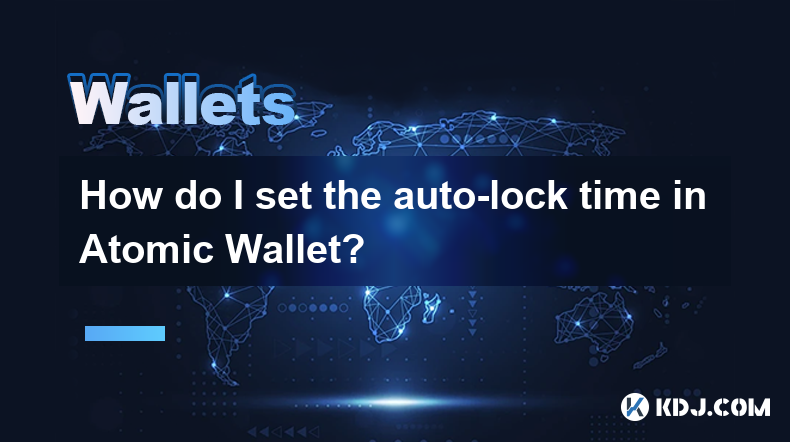
How do I set the auto-lock time in Atomic Wallet?
Mar 28,2025 at 07:35am
Understanding Atomic Wallet's Auto-Lock FeatureAtomic Wallet prioritizes security. A key aspect of this is its auto-lock feature, which automatically locks your wallet after a period of inactivity. This prevents unauthorized access to your funds should your device be compromised or left unattended. The auto-lock time is customizable, allowing you to ba...
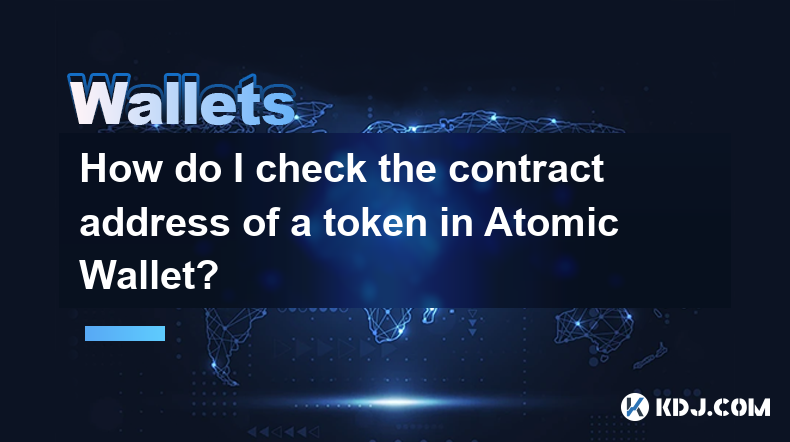
How do I check the contract address of a token in Atomic Wallet?
Mar 28,2025 at 07:49am
Locating Token Contract Addresses within Atomic WalletAtomic Wallet, a popular multi-currency wallet, doesn't directly display the contract address of a token within its main interface in the same way some other wallets might. This is because Atomic Wallet prioritizes user-friendliness, focusing on simplifying the user experience rather than displaying...
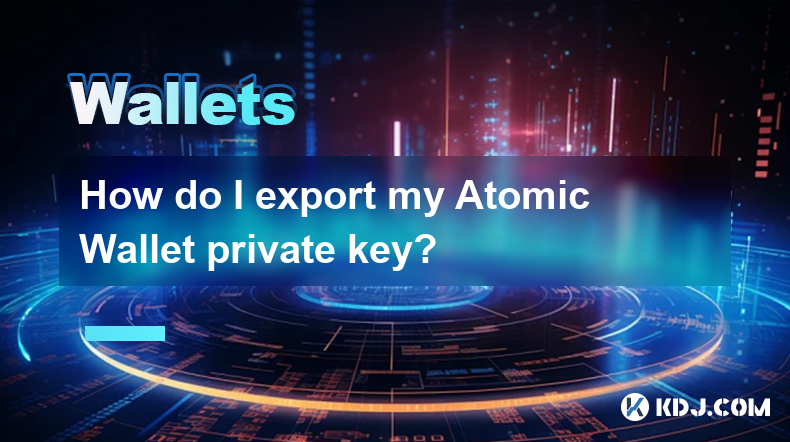
How do I export my Atomic Wallet private key?
Mar 27,2025 at 05:28pm
Atomic Wallet prioritizes security, and therefore, directly exporting your private key is not a feature offered within the wallet interface. This is a crucial security measure to protect your funds from unauthorized access. If someone gains access to your private key, they gain complete control over your cryptocurrency holdings. The wallet's design emp...
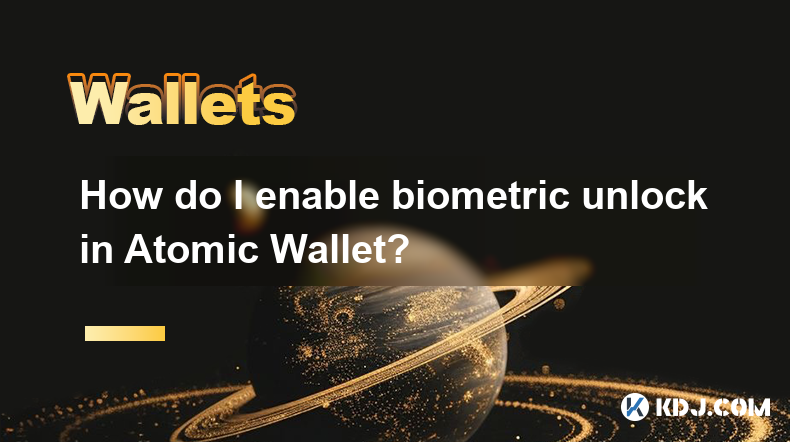
How do I enable biometric unlock in Atomic Wallet?
Mar 28,2025 at 02:14am
Biometric Authentication in Atomic Wallet: A Step-by-Step GuideAtomic Wallet offers a convenient security feature: biometric authentication. This allows you to access your wallet using your fingerprint or facial recognition instead of typing your password every time. This enhances security and convenience, but remember, it's an additional layer of secu...
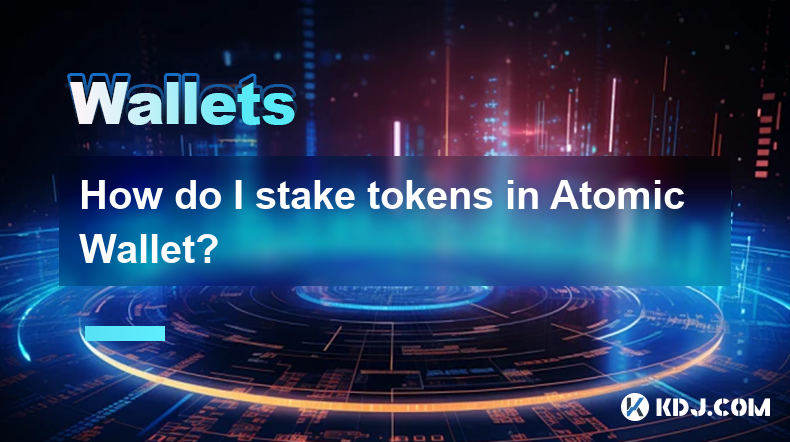
How do I stake tokens in Atomic Wallet?
Mar 27,2025 at 08:00pm
Understanding Atomic Wallet StakingAtomic Wallet offers a user-friendly interface for staking various cryptocurrencies. Staking allows you to earn passive income by locking up your tokens to support the network's security and validation. The rewards vary depending on the specific cryptocurrency and the network's conditions. Before you begin, ensure you...
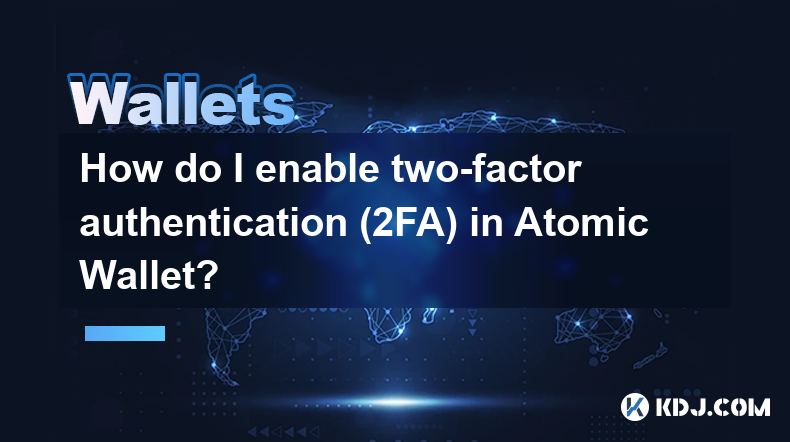
How do I enable two-factor authentication (2FA) in Atomic Wallet?
Mar 28,2025 at 04:56am
Enabling Two-Factor Authentication (2FA) in Atomic Wallet: A Step-by-Step GuideAtomic Wallet, a popular cryptocurrency wallet, prioritizes user security. Two-Factor Authentication (2FA) adds an extra layer of protection against unauthorized access, significantly reducing the risk of theft. This guide details how to enable 2FA within the Atomic Wallet a...

How do I set the auto-lock time in Atomic Wallet?
Mar 28,2025 at 07:35am
Understanding Atomic Wallet's Auto-Lock FeatureAtomic Wallet prioritizes security. A key aspect of this is its auto-lock feature, which automatically locks your wallet after a period of inactivity. This prevents unauthorized access to your funds should your device be compromised or left unattended. The auto-lock time is customizable, allowing you to ba...

How do I check the contract address of a token in Atomic Wallet?
Mar 28,2025 at 07:49am
Locating Token Contract Addresses within Atomic WalletAtomic Wallet, a popular multi-currency wallet, doesn't directly display the contract address of a token within its main interface in the same way some other wallets might. This is because Atomic Wallet prioritizes user-friendliness, focusing on simplifying the user experience rather than displaying...

How do I export my Atomic Wallet private key?
Mar 27,2025 at 05:28pm
Atomic Wallet prioritizes security, and therefore, directly exporting your private key is not a feature offered within the wallet interface. This is a crucial security measure to protect your funds from unauthorized access. If someone gains access to your private key, they gain complete control over your cryptocurrency holdings. The wallet's design emp...

How do I enable biometric unlock in Atomic Wallet?
Mar 28,2025 at 02:14am
Biometric Authentication in Atomic Wallet: A Step-by-Step GuideAtomic Wallet offers a convenient security feature: biometric authentication. This allows you to access your wallet using your fingerprint or facial recognition instead of typing your password every time. This enhances security and convenience, but remember, it's an additional layer of secu...

How do I stake tokens in Atomic Wallet?
Mar 27,2025 at 08:00pm
Understanding Atomic Wallet StakingAtomic Wallet offers a user-friendly interface for staking various cryptocurrencies. Staking allows you to earn passive income by locking up your tokens to support the network's security and validation. The rewards vary depending on the specific cryptocurrency and the network's conditions. Before you begin, ensure you...

How do I enable two-factor authentication (2FA) in Atomic Wallet?
Mar 28,2025 at 04:56am
Enabling Two-Factor Authentication (2FA) in Atomic Wallet: A Step-by-Step GuideAtomic Wallet, a popular cryptocurrency wallet, prioritizes user security. Two-Factor Authentication (2FA) adds an extra layer of protection against unauthorized access, significantly reducing the risk of theft. This guide details how to enable 2FA within the Atomic Wallet a...
See all articles




















































































